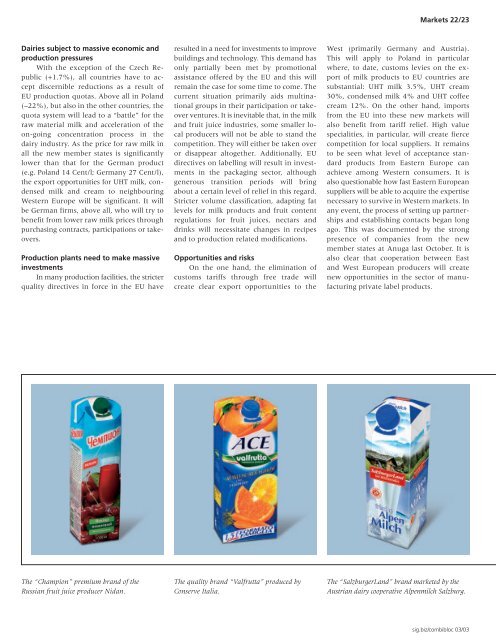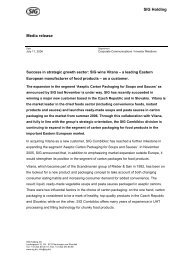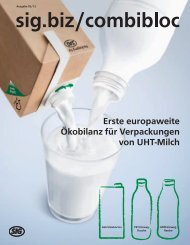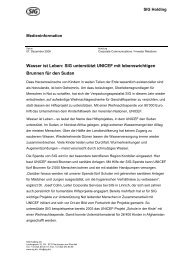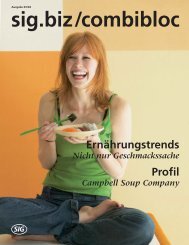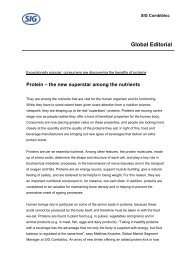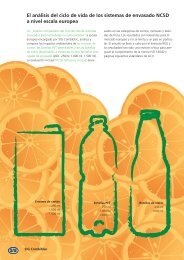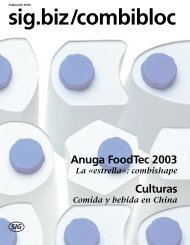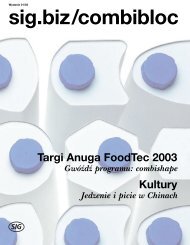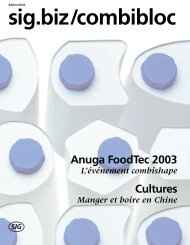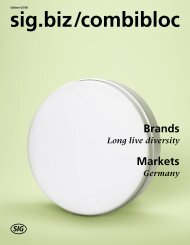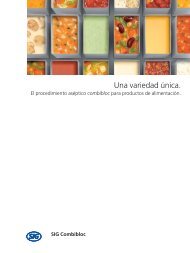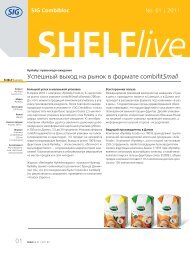Create successful ePaper yourself
Turn your PDF publications into a flip-book with our unique Google optimized e-Paper software.
Dairies subject to massive economic and<br />
production pressures<br />
With the exception of the Czech Republic<br />
(+1.7%), all countries have to accept<br />
discernible reductions as a result of<br />
EU production quotas. Above all in Poland<br />
(–22%), but also in the other countries, the<br />
quota system will lead to a “battle” for the<br />
raw material milk and acceleration of the<br />
on-going concentration process in the<br />
dairy industry. As the price for raw milk in<br />
all the new member states is <strong>sig</strong>nificantly<br />
lower than that for the German product<br />
(e.g. Poland 14 Cent/l; Germany 27 Cent/l),<br />
the export opportunities for UHT milk, condensed<br />
milk and cream to neighbouring<br />
Western Europe will be <strong>sig</strong>nificant. It will<br />
be German firms, above all, who will try to<br />
benefit from lower raw milk prices through<br />
purchasing contracts, participations or takeovers.<br />
Production plants need to make massive<br />
investments<br />
In many production facilities, the stricter<br />
quality directives in force in the EU have<br />
The “Champion” premium brand of the<br />
Russian fruit juice producer Nidan.<br />
resulted in a need for investments to improve<br />
buildings and technology. This demand has<br />
only partially been met by promotional<br />
assistance offered by the EU and this will<br />
remain the case for some time to come. The<br />
current situation primarily aids multinational<br />
groups in their participation or takeover<br />
ventures. It is inevitable that, in the milk<br />
and fruit juice industries, some smaller local<br />
producers will not be able to stand the<br />
competition. They will either be taken over<br />
or disappear altogether. Additionally, EU<br />
directives on labelling will result in investments<br />
in the packaging sector, although<br />
generous transition periods will bring<br />
about a certain level of relief in this regard.<br />
Stricter volume classification, adapting fat<br />
levels for milk products and fruit content<br />
regulations for fruit juices, nectars and<br />
drinks will necessitate changes in recipes<br />
and to production related modifications.<br />
Opportunities and risks<br />
On the one hand, the elimination of<br />
customs tariffs through free trade will<br />
create clear export opportunities to the<br />
The quality brand “Valfrutta” produced by<br />
Conserve Italia.<br />
Markets 22/23<br />
West (primarily Germany and Austria).<br />
This will apply to Poland in particular<br />
where, to date, customs levies on the export<br />
of milk products to EU countries are<br />
substantial: UHT milk 3.5%, UHT cream<br />
30%, condensed milk 4% and UHT coffee<br />
cream 12%. On the other hand, imports<br />
from the EU into these new markets will<br />
also benefit from tariff relief. High value<br />
specialities, in particular, will create fierce<br />
competition for local suppliers. It remains<br />
to be seen what level of acceptance standard<br />
products from Eastern Europe can<br />
achieve among Western consumers. It is<br />
also questionable how fast Eastern European<br />
suppliers will be able to acquire the expertise<br />
necessary to survive in Western markets. In<br />
any event, the process of setting up partnerships<br />
and establishing contacts began long<br />
ago. This was documented by the strong<br />
presence of companies from the new<br />
member states at Anuga last October. It is<br />
also clear that cooperation between East<br />
and West European producers will create<br />
new opportunities in the sector of manufacturing<br />
private label products.<br />
The “SalzburgerLand” brand marketed by the<br />
Austrian dairy cooperative Alpenmilch Salzburg.<br />
<strong>sig</strong>.<strong>biz</strong>/<strong>combibloc</strong> 03/03


